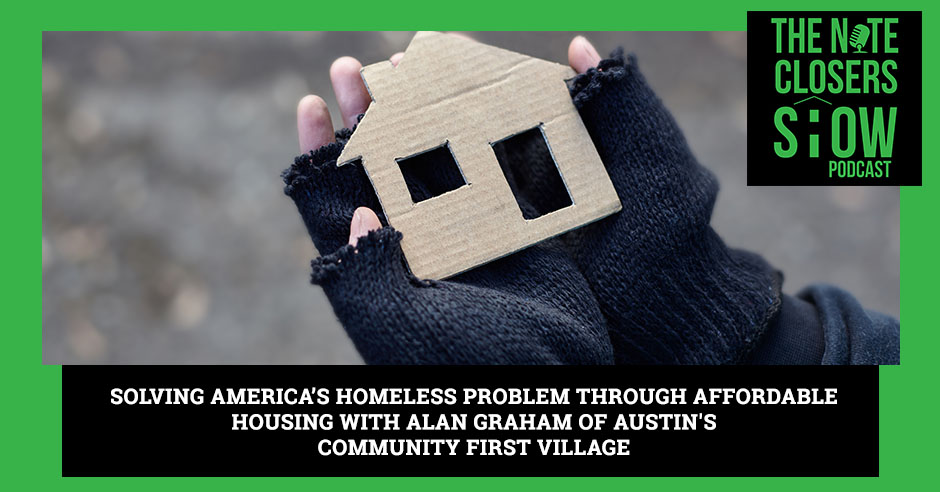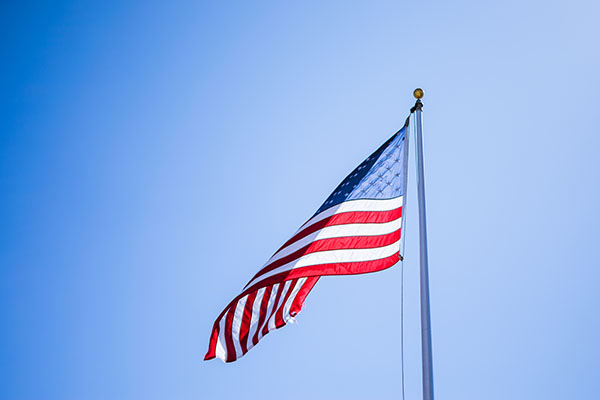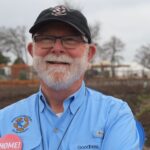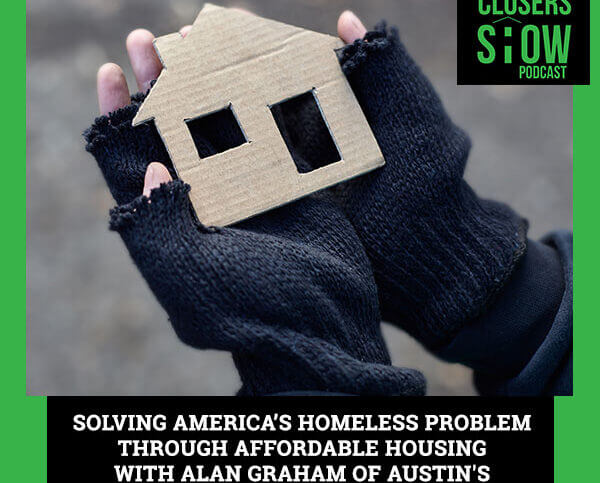
Community is critical to human nature. Most of us don’t even interact with our neighbors anymore because of all our riches. What more the homeless population. Not all panhandlers are pillagers and plunderers. Most of them just want a community, and that is what Alan Graham did. Alan is the founder of Mobile Loaves & Fishes, an organization that supports and is of service to the homeless. Scott Carson brings Alan to discuss what his company is all about. Learn what the Community First Village is about and how easy it is to be a part of. Find out how Alan is planning on building his community for the future.
—
Watch the episode here
Listen to the podcast here
Solving America’s Homeless Problem Through Affordable Housing With Alan Graham Of Austin’s Community First Village
I am excited to be here I am jacked up to have a very special guest. He’s known widely throughout Austin, Texas, and the world these days. It’s truly being not only an amazing individual, someone with a huge heart and a humanitarian. Some would say, an angel walking the Earth doing God’s work, helping Austin’s less fortunate and the homeless community here for many years. We talk a lot about helping people stay in their homes. People who have gone through financial hiccups and working to keep our borrowers their homes and we are buying the debt. This guy is truly doing something amazing with Austin’s most talked about community, the Community First! Village. He’s also the Founder of the Mobile Loaves & Fishes here in Austin, Texas. Alan Graham, we are honored to have you here on the show. How’s it going?
I’m awesome, Scott, thanks. I appreciate being invited. I’m humbled. This will be fun.
Before you’ve got into where you did, let’s talk a little bit about what you were doing before you started Mobile Loaves & Fishes back in 1998.
In 1978, I’ve got into the real estate business. I was going to the University of Texas. I hated school. I was sitting in a Fotomat kiosk for a part-time job and a buddy of mine in the real estate business comes up in a brand new white Mercury Marquis, wearing a suit with the air conditioning blowing on him. That looked like a better deal to me than where I was. I’ve got into the real estate business. I had a moderately successful career. I’ve got pretty heavily into development and toward the end of that career, that juxtaposed over the founding of Mobile Loaves & Fishes. We were developing air cargo facilities at airports around the country.
You started the Mobile Loaves & Fishes with a couple of your buddies, out of the backup of a green minivan, I believe is the word we are starting that there for you. What was that seed that sprouts the thought that brought you guys together to do that and decide that you wanted to make a difference?
The seed was a men’s retreat that I went on and in October of ‘96, where had I known that men were going to be holding hands and doing that bromance, hugging it out, I would have never gone. That was not my spirituality but it turned out it is. It was an incredible experience for over about 30 hours where I had this revelation and I begin to ask God, “What do you want me to do?” It started with the little things and honestly, to go feed people on the streets out of the back of the green minivan was not a big thing but it morphed into something pretty huge. That’s how I explained that deal in the short version.
That makes a lot of sense because there’s a long winding story along with it. You morphed into something amazing, 51-plus acres just outside of Austin, Texas and a breathtaking community. I want to highlight that word community because that is such a focal point throughout your ministry and bringing people together and Community First Can we talk a little about that and why it’s so important with your success?

Housing The Homeless: The United States of America, arguably the most abundant country ever in the history of the world. You’re assaulted by a gauntlet of beggars.
It has been a great learning process and there have been lots of tools along the way that have helped us put the skin on the skeleton of what it means to live in a community. It goes back to when my kids were little and we would jump in the car over the summertime and drive for 5,000 miles. We camp and stay in RV parks. I’ve got enamored with these RV parks that there was this inherent sense of community. I remember in one of them, a $1 million Prevost. That was in the 1990s, driving in and parking next to what was probably a $10,000 or $12,000 Jayco bunkhouse. The families would come out, cooking burgers and go to the movie nights.
When the idea in 2004 got into my brain to go out and buy one RV and lift one person off the streets into a privately owned RV park, it was because of that inherent sense of community that I experienced when my kids were young. That’s the foundation that we have been building on because I believe that you and I desire to be in the community. In a lot of ways, the way that we are living now in these subdivisions and these hermetically sealed single-family what we call the American dream with the sports courts, swimming pool, barbecue pits in the backyard and we don’t know our neighbors, that’s not how I grew up. I grew up getting my butt beat by the neighbor next door if we didn’t behave. You will be getting a spanking for many houses.
As they say, it takes a village to raise an idiot.
It does and we don’t know our neighbors anymore. We are probably afraid of our neighbors.
That is completely brave. You’ve got to go read some stuff and see the tour of the Community First Village. It’s about a twelve-minute video but well worth it talking about and it’s so unique. I can see with your real estate development background coming in, I won’t say self-contained but everything works so well together. Are you up to how many RVs, mobile homes or tiny homes in there now?
By the time we finish Phase 2, we will be at 550. We just announced a 1,400 home addition to that on another 126, 27 acres that we have. We are pretty excited. It’s going to get pretty big.
The one thing that popped out is you are not taking any money from HUD or the government. It’s all privately funded, is that correct?
I always like to caution people on that deal. There are areas of government that we all feast off of and Mobile Loaves & Fishes is no different. When we go out and develop something like this, our city participates with us, on fee waivers on development fees and that could be substantial. We also need water, wastewater and electricity from city-owned utilities and that’s important. Sometimes there are off-site utility costs. It’s because of the work that we do, they will fund and we need that.
We also partner with several different agencies that all work with the homeless population. Many of those agencies are funded with funding that comes from Federal State and local governments to help provide case management and things like that for people. The government does play an important role but all of our capital and primarily all of our operating expenses come from private individual philanthropy. That’s how we operate and it has been a great strategy for us.
One of the things that are unique about what you are doing out there is people are paying rent. They’ve got to pay rent to stay out there, correct?
That’s correct. That’s our number one rule. People ask us, “What are the rules, Alan?” I go, “They are the same rules you live by.” Rule number one is you must pay rent. Everybody is in it. Nobody gets away from it. There is no free rent, believe it or not. Nobody gets a free ride no matter what you think the government does and how they subsidized it. I have seen people kicked out of Section 8 Government Housing for not paying their $50 a month rent.

Housing The Homeless: You can’t continue to sustain yourself without making room for people that don’t make much money.
Rule number two is you must be obedient to Civil Law that applies to every one of us. All of us break it, by the way. I don’t know anybody that has not been pulled over many times for speeding. I could go down the list of other laws I have broken but I’m going to keep those in my skeleton closet. We live in a community here that’s governed by rules like a homeowner’s association would be or a condo deal. They are pretty simple rules. Just pay your rent really and truly and don’t be an ass.
That goes a long way. Like the Golden Rule, treat people like you want to be treated.
There are a lot of things you can get away with in terms of what you do in the privacy of your own home and that’s none of my business.
What I loved about the visit out there and spending more time with research and everything like that is you’ve got the community out there, not just living out there but they are working out there and a variety of things. You are also providing places for them to showcase their talents, the artistic side of things or the handcrafting of goods and stuff like that. You’ve also got the bed and breakfast out there that you operate, the auto care center for an oil change and tune-up and stuff like that. That has got to be probably one of the most fulfilling things for a lot of people out there that want to work. I think most people want to work and want to make an honest salary. Would you agree to that?
I have never met anyone that didn’t want to do that and the evolution of all that stuff that you mentioned, came out of my observation. Why would anyone want to panhandle? It’s nickels, dimes and quarters with a very low success rate that amounts to money that nobody on the planet can live on. I then realized that when I grew up and when I moved to Austin, there were no panhandlers in the Houston area where I came from or Austin. It was many women on street corners, selling newspapers, bottles of water, flowers, cow skulls, cow skins and Velvet Elvis art.
We have outlawed all that stuff. You can’t do that stuff anymore and so the only remaining bastion of entrepreneurialism for people that live in extreme poverty is the First Amendment free speech to hold a sign and beg. I find that ridiculous. Go to Mexico now you are going to get assaulted by a gauntlet of entrepreneurs from the United States of America, arguably the most abundant country ever in the history of the world. You are assaulted by a gauntlet of beggars. I realized that people want to work, panhandling is work, that’s not easy. I have done it. It’s humiliating and pathetic. We wanted to create a purposeful environment and as a result, since we have been here, our neighbors have earned about $3.5 million, about $1 million in 2020 alone.
It was incredible especially in a time of pandemics and everything like that.
Our neighbors were living large. When I say large, it’s not large in the way people think but let me tell you, I did a podcast with one of my friends who grew up in pretty extreme American poverty. He said when he moved in here, he felt like he moved into a rich neighborhood.
It was nothing that felt poor about the community because it is nice, clean and you see people stepping over all the time to pick up scraps. They do take the pride in that community there, the home. I honestly understand. I had self-policed a lot of times. You were talking about how you have had very few calls of any type of criminal activity, anything like that or the police been called. The surprise was the fact that it was nine incidences of theft and it was from kids from the next door housing community and not yours.
The middle-class housing single-family hood, not a project just to put it into context but that’s all right. What we are trying to do is let people know that these are criminals. These aren’t your pillagers and your plunderers. That’s not who this is.
With homelessness seeming to grow as they say. You didn’t mention this, it was about the same amount has been for the last few years in Austin, if I remember correctly.
As a per capita percentage of the population growth, homelessness has remained flat.
Besides 100 and some odd acres and you see all different cities across the country, trying to work to solve that. Austin’s doing something different with hotels and trying everything. You have probably been reached out to by a ton of other cities and community leaders across the country to review what you are doing and doing that. What’s your answer? If you have, we may not have the time for it. Was it a change in mindset that our leaders need to change or people need to change or you started helping one man at a time we go from there?

Housing The Homeless: You must pay rent. Nobody gets a free ride, no matter what you think the government does and how they subsidize it.
We have a replication model pre-pandemic. It went on pause once COVID-19 hit March of 2020. We have a 3-day symposium with over 400 people from 150 cities. Thirty-two states have been here. They spent three days with us. We have a post-symposium process that they can enter in that even includes a six-month cohort where they fly into Austin 3 or 4 times and dive deep into the work we do. We have several replications going on around the country as we speak now. We believe that we have a new movement and how we can address this issue and Scott, movements take a while to kick in. I think it’s a twenty-year process for people and I would legitimately say that we are 4 or 5 years into that 20-year deal.
It does take time to move things but thinking back now from ‘98, did you have any thought that a Community First or Mobile Loaves & Fishes would be where it’s at, at this moment when you guys started?
From a Community First point of view, the answer would be no. I had no idea then. As a serial entrepreneur and a dreamer, I have always thought all my ideas were the greatest ideas on the planet. Also, I was realizing that by ‘98, that not all of my ideas are that great. I had to flush a few of my ideas down the toilet but I thought that I could replicate the truck operation all over the US and that would be a good idea. God had something different in mind and here’s what we ended up doing.
That’s what they always say, “Man plans and God laughs.” Has there been any huge hurdle over the last twenty? I probably hurdle every day in a variety of different things but any hurdle that you guys have had to overcome that stands out more or so?
The big hurdle for anyone in this line of work is what we call NIMBY, Not In My Back Yard and that is fueled by something called zoning, discretionary land use suggesting that use such as whatever is not appropriate in this particular neighborhood. That applies to Walmart as much as it applies to the chronically homeless or affordable housing. Somehow, culturally, we have to grapple with that issue as a culture. I’m afraid that the only way I don’t know how you get rid of it without getting rid of Sony. We can’t continue to sustain ourselves without making room for people that don’t make much money and we should all be intolerant of crime but I can tell you that property values have not dropped in my neighborhood.
If you wanted to buy a house next door, if it came on the market for $350,000, you better offer $50,000, $60,000, $70,000 more than that if you want to own a house. I’ve got one kid that put in an offer on a house, not in the neighborhood next door but Austin, in a neighborhood that was struggling in North Austin and offered $50,000 or $60,000 over what they asked for the house. This doesn’t have anything to do with that. There is no crime or material we can’t operate on the what-ifs. What if somebody comes over here? Sometimes bad things happen in the world in a way of preventing that.
What’s the kind of the process for somebody moving into Community First? Do they have to go through counseling or drug tests? How does somebody find their way into Community First or churches, other groups or how is that qualification process?
We operate off of a definition that you have to be an unaccompanied male or female, no children with one or more disabilities and having lived on the streets of Austin for at least one year. The average age here is 58 years old, the average number of years on the streets is ten years. 65% of our people have two or more comorbid diseases and these diseases can include addiction. We don’t drug test people, when they come in we have active attics that move into the community. 98% of our addicts are great people like the addicts and the alcoholics that you know. They are good people. We then monitored. I would say about 6 people out of the 270 that live here right now that their problem is a little bit deeper and starting to have an impact on the community and we monitor that and do the best we can to help manage that.
It’s best if they come in through one of the about a dozen partner agencies that we work with, that work in the homeless space. We love for them to have case managers when they come in. They are not being tested, there’s no therapy or any of that. It’s about getting them off the streets first, and then we will begin to address any of the other issues, if we feel like that we have to address those issues. It does take a while to get in. It’s the nature of the supply-demand issue. The demand is a whole lot higher than the supply.
When you are finished with the new development you said, you will have at least closer to 1,600? The third is 1,400 new homes.
Phase 3 and 4 are led 1,400 to 550 so it will be nearly 2,000 homes or somewhere around that number.
You won’t be a village anymore. You will be your own city in some cases. Are there any growing pains that you foresee getting there? You probably re-identified those and stuff like that. Is it raising funds? Is it finding RVs or home to build? What’s going to be your biggest hurdle to complete that?
That part of it is relatively easy. It’s scaling an operation that is going to grow from managing under 300 people to managing under 2,000 people so there will be a staffing scale issue. Right now, we build about 100 homes a year. We’re a legit home builder and we will move into building about 400 homes a year. What does it take to scale? That’s an issue. Our OPEX model will grow. We will probably multiply by 3X roughly and that’s an issue. We are about an $8 million OPEX deal now that will run into the $20 million range, give or take. With the sheer numbers, how do you plan into that community the level of intimacy? We have two brilliant architects that are here full-time on staff. One of them came up with an idea called the Neighborhoods of Knowingness that I think will win awards. That’s my prediction. The concept and the implementation of that concept are going to be pretty powerful.
With the average year of being homeless on there and coming out of that into the community there, what do you see is, I won’t say shock and awe. There has got to be some shock and awe a little bit from some people coming into the community who have lived differently in the last few years. I’m sure it’s probably mostly in a good aspect of things but you see a little bit of a transition period for people to maybe let go because we had a conversation talking about people who were there and how stressful it is living homeless and the violence that goes along with it, especially for women. Do you see in people this whole layer of armor falls off a little bit after a while?
We are always bringing who we are to the table wherever we go. You and I get to bring our white guy culture. We might be conservative or liberal. We will bring our lived experiences to the table and our brothers and sisters up off the streets are the same things. If their average time on the streets is 10 years, which means some of them were there for 40 years, it’s a cultural shock. It’s not unusual to move somebody in and see him sleeping on their front porch for a while. I knew somebody that didn’t even sleep in their bed for probably 2 or 3 months. What psychologically drives that? I don’t know. We just live into it and join them in that struggle. I have people that have been in here for 3 or 4 years and are now acclimating to this. It takes time and it’s going to be different for about every person that moves in and their own circumstances are going to dictate that. What we do is demand improvement but we are flexible on the timing.
That makes sense. I like how you put that there for you. You’ve got a huge volunteer staff there but how many full-time staff members do you have there at Community First and then maybe it’s probably a combination of people that help with Mobile Loaves & Fishes and also Community First, correct?
I’m not sure what the staff count is right now. We are in the 60s. We will be probably at 75 by the end of the year or somewhere around that number. The budget this year was to add about fifteen people. We are aggressively hiring right now. There are probably 7, 8 job prescriptions out. Normally pre COVID-19, we averaged about 285 volunteers a week. Coming out here that went down to essentially zero. It’s starting to come back now. I don’t know what the numbers would be but nowhere near that. We are excited about the vaccine and hopefully, we are going to be back up to full operating here in a few months. We do need to see the local numbers drop pretty good. We were thinking they were going to drop by mid-April into Phase 2 but we are still stuck in this Phase 3 thing so we will see.
Now with the 200-plus community members living out there, you were able to get Austin Metro to put a bus stop on there. How many of the community members on average who are transitioned to jobs and other things outside of Community First?
That’s an extremely rare deal. I only know of very few that work offsite. I would say under 4, 5 people. Our population, they are not employable in the conventional sense and about 70% to 80% of our neighbors are earning SSI or SSDI. They are declared disabled and we talked about the disability thing. The balance can work onsite. $1 million divided amongst a lot of people creates a nice little boost and in your income. It’s not very many.
I wanted to bring that because it was such a beautiful thing on how everybody is working together, the gardens, the little porters, the housekeeping, the bed and breakfast. Is the community even back up and working?
I think by the end of June 2021, it will be back up and going.

Housing The Homeless: Heart first. Pocket second.
One of the things that I was always amazed by is seeing the community. We mentioned one thing. When somebody passes how everybody comes together to stand around and be there in silence or a community healing aspect of things when somebody does pass in the community. I found that amazing. On the website, you always talk about how probably the number one factor for homelessness is the lack or loss of family.
I would say that when somebody passes away, on average about 80 to 100 people we will gather outside their home and will not leave until the body is removed from their home. It’s beautiful, emotional and could be several hours, 5, 6, 7 hours out there. It’s amazing to watch.
I also love the fact how you mentioned and we were able to talk with some of the women there. How every home has a custom decoration to fit the person moving in? It is like building a home versus something that’s a sterile box like a lot of other communities are using.
When you move in, you are going to move into a completely furnished, ready-to-go home with brand new beds and bedding. Nobody ever sleeps on a bed to another human slept on. We will interview you before moving in find out your favorite colors, themes and we try to meet that somehow.
Alan, what would you say is the number one need now for Mobile Loaves & Fishes or Community First? What’s one big need that you are working towards besides the growth? What’s one big underlying need that the community is looking for besides hiring a few people?
Scott, the biggest need we have is to get as many people out here to see what you have seen as possible. When people come out here, if they are inspired the way that you are and we believe that they will, then we want them to jump in with us. We want them to say to themselves from within their heart, “I love what those guys are doing. I want them to join the other.” It’s like this show now, we are joining together. You are going to blow us out and who knows the impact that this will have. We then trust that and the whole process.
The giant pile of money that we need to do all the work that we need will ultimately come in but it’s a heart first, pocket second. The way that we get there is by getting people out here so they can see what’s possible in our city. We want to build hope within our city of understanding that what they view as being a mess out there on the streets is very mitigatable with the right strategy and that what we have here at Mobile Loaves & Fishes is a very large piece of that strategy. We are not the only thing but we are a big thing.
Are you guys starting tours back up again?
I love them as we did. We are not doing the big public tours yet that we were doing. We did three of those awake but private tours all day long. All you have to do is email us and we are ready to get you out.
When you are on a tour, everybody knows Alan. Everybody knows everybody out there, which is one of the most amazing things. They know everybody’s story and it is a community. I don’t care where you are at, you’ve got to make time. If you make it to Austin, you’ve got to get out and seek Community First! Village. It’s amazing, Alan.
That twelve-minute video you talked about is pretty awesome but there’s nothing like coming out here and doing it yourself.
The twelve-minute video is a great little teaser piece but it has nothing to do. Photos do not do it justice compared to everything out there. Alan, what’s the best way for people to get involved or to find out and how they can connect? Is the website Mobile Loaves & Fishes or what’s the best way to go?
The website is MLF.org. That’s Mobile Loaves & Fishes. My email is Alan@MLF.org. You are welcome to email me. I’ve got an executive assistant that will help me schedule things so please come out. There are lots of great stuff on our website. It’s a very well-done website and always up-to-date. We have lots of articles. We get lots of publicity from all the news media. Go check all that out and then give us a shout. We would love to have you out here.
Alan, thanks so much for coming on the show and being an inspiration. Inciting inspiration, motivation and goodness in so many people out there.
—
That’s going to wrap it up for this episode of our show. Go do something. Helping one person at a time can go a long way. How do you start a movement? How do you start ablaze? You would light one match and go from there. Alan’s created such a huge blaze of goodness in helping our fellow men out there, especially the less fortunate. Go out and take some action. We will see you all at the top. Bye.
Important Links:
About Alan Graham
 For Alan Graham, it is all about his relationships—with God, his family, staff members and certainly the homeless men and women he’s been engaging on the streets of Austin for more than two decades.
For Alan Graham, it is all about his relationships—with God, his family, staff members and certainly the homeless men and women he’s been engaging on the streets of Austin for more than two decades.
Alan is the founder and CEO of Mobile Loaves & Fishes (MLF), a social outreach ministry that provides food and clothing, cultivates community and promotes dignity to homeless men and women in need. Previously a real estate investor and developer, Alan founded Trilogy Development and the Lynxs Group, which developed Austin’s airport cargo facility and similar facilities at airports around the country.
In 1998, the seed for the idea of Mobile Loaves & Fishes had been placed on Alan’s heart. He and four friends boldly answered God’s call to “love your neighbor” by delivering meals to homeless men and women from the back of a green minivan. Alan readily admits that the group’s original approach for serving the homeless had some flaws, but with the help of a formerly homeless man, Houston Flake, they perfected the model that Mobile Loaves & Fishes successfully uses today. Since its founding, MLF volunteers have served more than 5 million meals with a side of hope to homeless men and women living on the streets of Austin, and the organization has spawned similar food truck ministries in other cities across the U.S.
Alan also is the lead visionary behind MLF’s Community First! Village—a 51-acre master planned development in northeast Austin that provides affordable, permanent housing and a supportive community for men and women coming out of chronic homelessness.
Alan and his wife, Tricia, were married in September 1984 and have four children of their own, as well as a niece they’ve been blessed to raise and include in their family. Alan is a published author of the book Welcome Homeless: One Man’s Journey of Discovering the Meaning of Home. He also is the host of the Gospel Con Carne podcast, which explores the woundedness of society through untold stories of individuals who have encountered homelessness.
Love the show? Subscribe, rate, review, and share!
Join the Note Closers Show community today:

